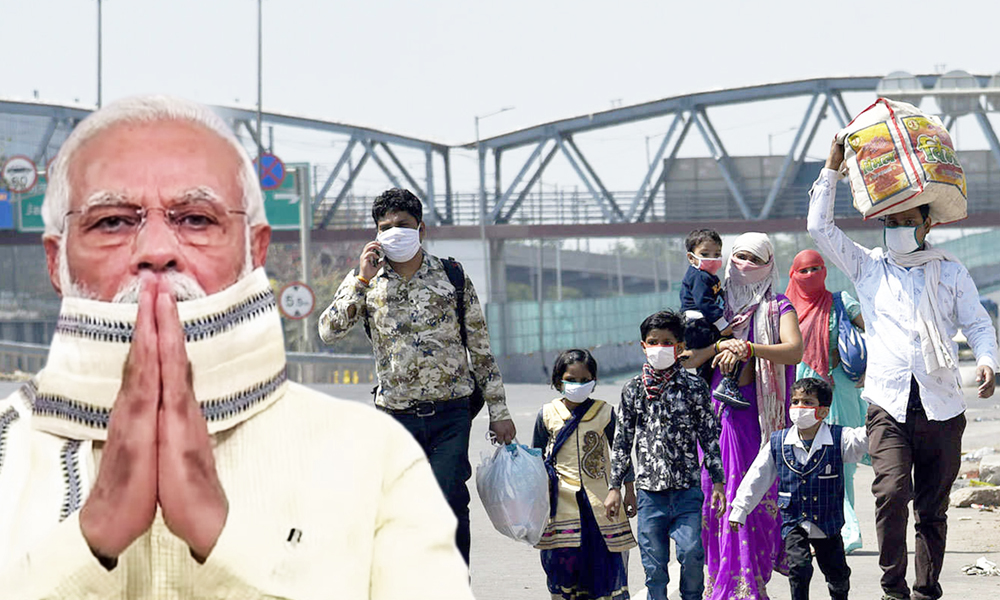
Image Source: Economic Times, India Today
#Exclusive: Centre Cites 'National Security' To Deny Info On Migrant Crisis Preparedness
India, 4 Nov 2020 12:40 PM GMT
Guest Author : Saurav Das
Independent journalist, RTI activist. Mostly into investigative journalism.
Want to know how Modi govt prepared to handle immediate consequences of sudden national lockdown? You can’t. Centre cites “national security”, trust issues, to deny information on an RTI filed by Saurav Das on behalf of The Logical Indian.
The sudden national lockdown announced by Prime Minister Narendra Modi on March 24, 2020 left scores of migrant workers stranded, all over India. To add to their woes, many places of employment refused to shelter them or provide any kind of assistance. Left with no options and transport, thousands of migrants soon started their journey home, on foot. At least a 1000 people died due to this crisis, as per a study conducted by a group of independent researchers. This sudden decision to implement the lockdown, without giving adequate time to people was taken by the National Disaster Management Authority, headed by Prime Minister Modi.
Now, the Modi government has refused to provide any information about the migrant crisis, citing "National Security" in response to an RTI filed by this author on behalf of The Logical Indian.
The RTI sought details about any meetings that took place to discuss possible consequences of the national lockdown, meetings on possible mass movement of people and any relief measures put in place to mitigate such fallout after the announcement.
However, the Ministry of Home Affairs refused to provide the information, invoking exemptions Section 8(1) (a) and 8(1) (e) of the RTI Act.
Screenshot of RTI and Reply of MHA
What are the two exemptions invoked by Centre to deny Info?
Section 8(1) (a) says that information need not be furnished if it would "prejudicially affect the sovereignty and integrity of India, the security, strategic, scientific or economic interests of the State, relation with foreign State or lead to incitement of an offence". However, the Ministry failed to substantiate why it feels this information, if disclosed, would prejudicially affect India's security or sovereignty. Any public authority should justify invoking exemptions as per many orders of the Central Information Commission.
Section 8(1) (e) says that information need not be furnished if it is "available to a person in his fiduciary relationship, unless the competent authority is satisfied that the larger public interest warrants the disclosure of such information". Fiduciary relationship is defined as any relationship where one party is in duty to act for the benefit of the other party. Examples would be- lawyer-client relationship and doctor-patient relationship.
"Illegal, Illegitimate Use of Exemptions", says former CIC
Shailesh Gandhi, former Central Information Commissioner said that neither of these two exemptions is applicable and Ministry is resorting to "kite-fly", meaning, using any exemption without giving it a thought. "Clause (a) is very wide. It involves national security, sovereignty, integrity, scientific interests, foreign relations, etc. There could be a reason that we may not be able to see, so for this, public authorities are required to provide exact reasons for invoking an exemption clause. The Ministry has failed to do so, which is their first illegality. However, even so, I do not see how this information could prejudicially affect India's national interests", he said.
On the Ministry claiming that its holding this information in a "fiduciary relationship", it should be noted that the Supreme Court of India in the Reserve Bank Of India vs Jayantilal N. Mistry had said that "where information is required by mandate of law to be provided to an authority, it cannot be said that such information is being provided in a fiduciary relationship". The Ministry failed to provide details of the party with whom it is in such a relationship with. Be that as it may, it is preposterous to even think that the Ministry is working in any other person/party's interest and is required to conceal this information. It is not in a relationship of 'trust' with them nor does it work to maximise the benefits of any such parties.
People have an absolute right to know about all the decision-making process relating to the pandemic as it directly affects them and is in the larger public interest. Therefore, such a stand taken by the Ministry is completely untenable.
Why is the Centre denying this information?
During May 2020, the Central Information Commission (CIC) had directed the Union government to maintain meticulous record of all public expenditure and disclose details of welfare measures undertaken during the Covid-19 outbreak. However, that does not seem to be happening.
The National Disaster Management Act lays down "guidelines for minimum standards of relief, including "ex gratia assistance on account of loss of life... and for restoration of means of livelihood". However, the Government of India did not have a national plan in place for a very long time. Had this been prepared, before the national lockdown, such a crisis could have been foreseen and mitigated by relief measures.
Modi government has been severely criticised for its handling of the pandemic. Opposition parties have alleged that it is deliberately trying to hide the information because it is likely to show them in bad light. Government's unpreparedness for the consequences of the harsh lockdown was evident when it had no clue on how to control the mass migration of migrant workers. Remember, the DM Act required them to make a national plan to mitigate such problems but the law wasn't followed. Only after a massive public outcry, the government allowed Shramik-special trains, buses and private vehicles to ferry them home, though this too was not satisfactorily executed.
Now its denial to furnish details of its preparedness only reinforces people's doubts and does little to allay them.
 All section
All section














